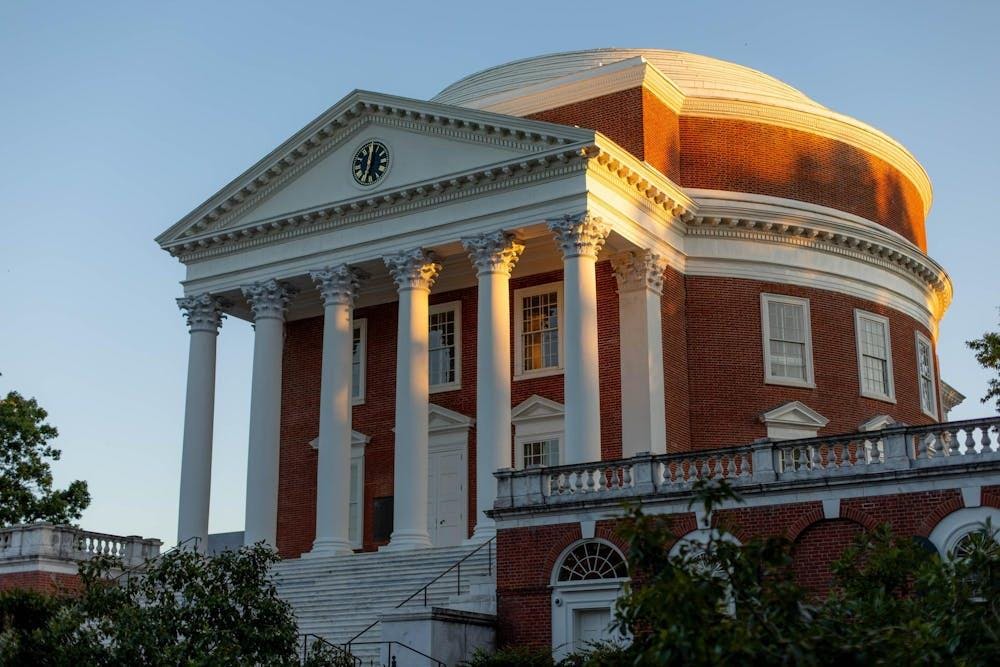The Trump administration has sent out a letter outlining a proposed set of operating principles for universities that would give select universities preferential access to federal funding in exchange for adhering to certain conditions, the Wall Street Journal reported Wednesday. The University is among the nine institutions the administration invited to join the initiative.
The Cavalier Daily obtained copies of the invitation letter addressed to interim University President Paul Mahoney and the attached proposal from an anonymous source. The invitation letter, addressed to Mahoney, was signed by Secretary of Education Linda McMahon, May Mailman, senior adviser for special projects at the White House, and Vincent Haley, director of the Domestic Policy Council and a School of Law graduate.
“Thank you for your tireless work to improve higher education in our country,” the invitation read. “The Administration is committed to a forward-looking vision of higher education that serves our nation by helping the next generation grow into resilient, curious, and moral leaders, inspired by American and Western values.”
University spokesperson Bethanie Glover confirmed that Mahoney had received these documents Wednesday night and has created a working group to respond.
“This morning, he created a working group under the leadership of Executive Vice President and Provost Brie Gertler and Executive Vice President and Chief Operating Officer J.J. Davis to advise him on the University of Virginia’s response to the letter. The University has not yet made any decision regarding the Compact,” Glover said.
The proposal, called the “Compact for Academic Excellence in Higher Education,” lays out ten requirements to which participating universities would agree in exchange for what the administration described as “substantial and meaningful” federal support. According to the WSJ, institutions that sign on would receive priority for federal grants and invitations to the White House to meet with officials.
The White House selected the nine universities because it believes they are or could be “good actors,” Mailman told the Wall Street Journal.
“They have a president who is a reformer or a board that has really indicated they are committed to a higher quality education,” Mailman said to the WSJ.
The compact’s conditions include freezing tuition for five years, prohibiting the consideration of race or sex in admissions and hiring, capping international undergraduate enrollment at 15 percent, requiring undergraduate applicants to take the SAT or other widely used standardized tests, and limiting grade inflation.
It asks universities to maintain “institutional neutrality,” which includes restricting employees from making political statements on behalf of their institutions. At the University, a policy similar to this is already in place — employees are required to ensure they do not imply that any political positions are endorsed by the University. In September 2024, the University also adopted a “position of neutrality,” which advises leaders only to comment on political events when they directly impact the University.
The compact also calls for campuses to promote what it describes as a “marketplace of ideas.”
“Signatories commit themselves to revising governance structures as necessary to create such an environment, including but not limited to transforming or abolishing institutional units that purposefully punish, belittle, and even spark violence against conservative ideas,” the compact read.
The compact’s longest section, focused on “foreign entanglements,” requires universities to screen international students for “extraordinary talent” and alignment with “American and Western values,” disclose all foreign gifts and contracts and implement anti-money laundering compliance programs overseen by a designated officer.
“Universities that rely on foreign students to fund their institutions risk, among other things, potentially reducing spots available to deserving American students, and if not properly vetted, saturating the campus with noxious values such as anti-Semitism and other anti-American values, creating serious national security risks,” the compact read.
Institutions would also be responsible for publishing grade distribution dashboards, posting average graduate earnings by program, and refunding tuition for undergraduates who withdraw during their first semester.
Although the agreement is voluntary, universities that sign and later fail to comply could be required to return both federal funds and private contributions received during the year, according to the report. University leaders would be responsible for certifying adherence to the compact each year, alongside an independent survey of faculty, students and staff.
“The university annually shall conduct, or hire an external party to conduct, an independent, good faith, empirically rigorous, and anonymous poll of its faculty, students, and staff, providing them the opportunity to evaluate the university’s performance against this compact. The results of such surveys shall be made public and available on the university’s website,” the compact read. “Adherence to this agreement shall be subject to review by the Department of Justice.”
According to the letter sent to Mahoney, those who sign onto this compact will show a strong signal that universities are complying with federal priorities.
“The Federal Government would have assurance that signatory schools are complying with civil rights law and pursuing Federal priorities with vigor,” the letter read.
This compact follows months of tension between the Trump administration and top universities across the country over diversity practices and campus antisemitism. Some institutions, including Columbia University and Brown University, have reached multimillion-dollar settlements with the administration, while others, such as Harvard University, remain locked in disputes.
The University itself faced pressure from the Justice Department regarding its admissions policies, concerns around antisemitism and Diversity, Equity and Inclusion practices, which culminated in the resignation of former University President Jim Ryan. At a meeting of the Board of Visitors Sept. 12, Mahoney announced that two investigations into the University by the Justice Department had been closed, although five other investigations are still ongoing.
In addition to the University, the institutions invited include Dartmouth College, Vanderbilt University, University of Pennsylvania, University of Southern California, Massachusetts Institute of Technology, University of Texas, University of Arizona, and Brown University.
According to the letter accompanying the proposal, universities have until Oct. 20 to submit “limited, targeted” feedback. The Trump administration said it intends to finalize language and secure initial signatories by Nov. 21.







